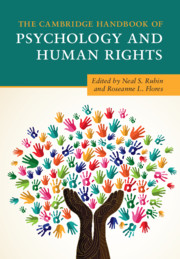Book contents
- The Cambridge Handbook of Psychology and Human Rights
- The Cambridge Handbook of Psychology and Human Rights
- Copyright page
- Dedication
- Contents
- Figures
- Tables
- Boxes
- Contributors
- Acknowledgments
- The Core International Human Rights Instruments and Their Monitoring Bodies
- Universal Human Rights Instruments
- Sustainable Development Goals
- Glossary of United Nations and Psychology Acronyms in the Handbook
- Introduction
- Part I History of Human Rights
- 1 How Fear and Hope Shaped the Universal Declaration of Human Rights
- 2 Human Rights Developments from the Universal Declaration to the Present
- 3 Connecting Human Rights and Psychological Ethics in a Globalizing World
- 4 A Historical Narrative of Psychology Engaging Human Rights within the Framework of the United Nations
- Part II The Intersection of Psychology and Human Rights
- Part III Contemporary Issues in Psychology and Human Rights
- Part IV Teaching, Research, and Training in Psychology and Human Rights
- Part V Future Directions
- Index
- References
2 - Human Rights Developments from the Universal Declaration to the Present
from Part I - History of Human Rights
Published online by Cambridge University Press: 02 October 2020
- The Cambridge Handbook of Psychology and Human Rights
- The Cambridge Handbook of Psychology and Human Rights
- Copyright page
- Dedication
- Contents
- Figures
- Tables
- Boxes
- Contributors
- Acknowledgments
- The Core International Human Rights Instruments and Their Monitoring Bodies
- Universal Human Rights Instruments
- Sustainable Development Goals
- Glossary of United Nations and Psychology Acronyms in the Handbook
- Introduction
- Part I History of Human Rights
- 1 How Fear and Hope Shaped the Universal Declaration of Human Rights
- 2 Human Rights Developments from the Universal Declaration to the Present
- 3 Connecting Human Rights and Psychological Ethics in a Globalizing World
- 4 A Historical Narrative of Psychology Engaging Human Rights within the Framework of the United Nations
- Part II The Intersection of Psychology and Human Rights
- Part III Contemporary Issues in Psychology and Human Rights
- Part IV Teaching, Research, and Training in Psychology and Human Rights
- Part V Future Directions
- Index
- References
Summary
This chapter summarizes developments in international human rights law, mechanisms, and policies since the Universal Declaration of Human Rights was adopted. We first describe the nine core human rights treaties, including the International Covenant of Civil and Political Rights and the International Covenant on Economic, Social and Cultural Rights, which together converted the Declaration’s ideals into international law, and the seven conventions with the goals of eliminating racial discrimination, discrimination against women, torture, and enforced disappearances, and protecting the rights of children, migrant workers, and their families, as well as persons with disabilities. We follow with summaries of the Genocide Convention and of the UN declarations proclaiming the rights of indigenous peoples and LGBTI individuals. We next describe the UN mechanisms for advancing human rights, including the High Commissioner for Human Rights, Human Rights Council, and International Criminal Court. These are followed by summaries of UN policies for protecting persons from governmental abuses, ending the world’s worst poverty and suffering, and providing human rights guides for businesses. We then summarize developments in international humanitarian law (the laws of war) and conclude with a brief overview of the five regional human rights systems.
Keywords
- Type
- Chapter
- Information
- The Cambridge Handbook of Psychology and Human Rights , pp. 25 - 40Publisher: Cambridge University PressPrint publication year: 2020
References
- 2
- Cited by



